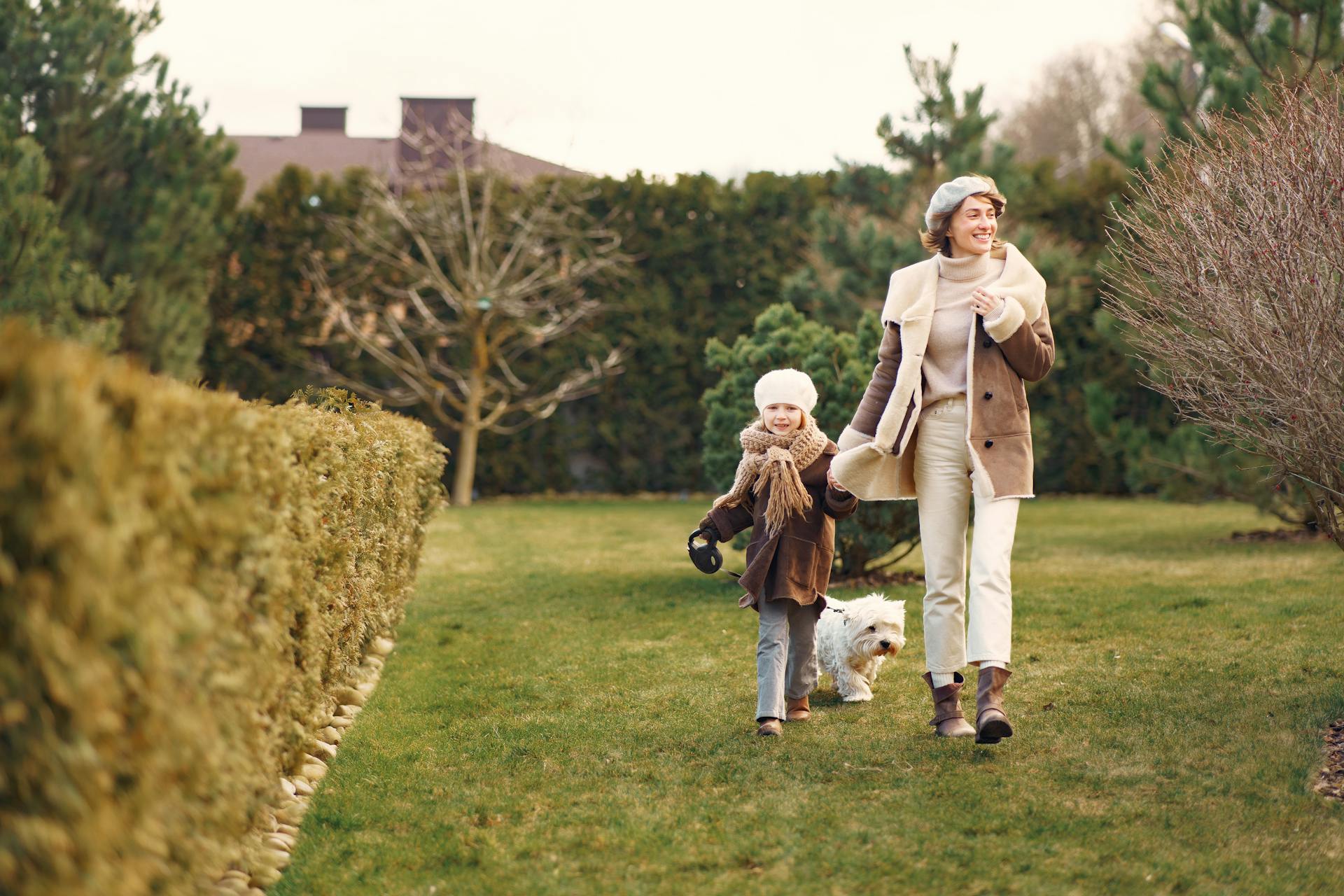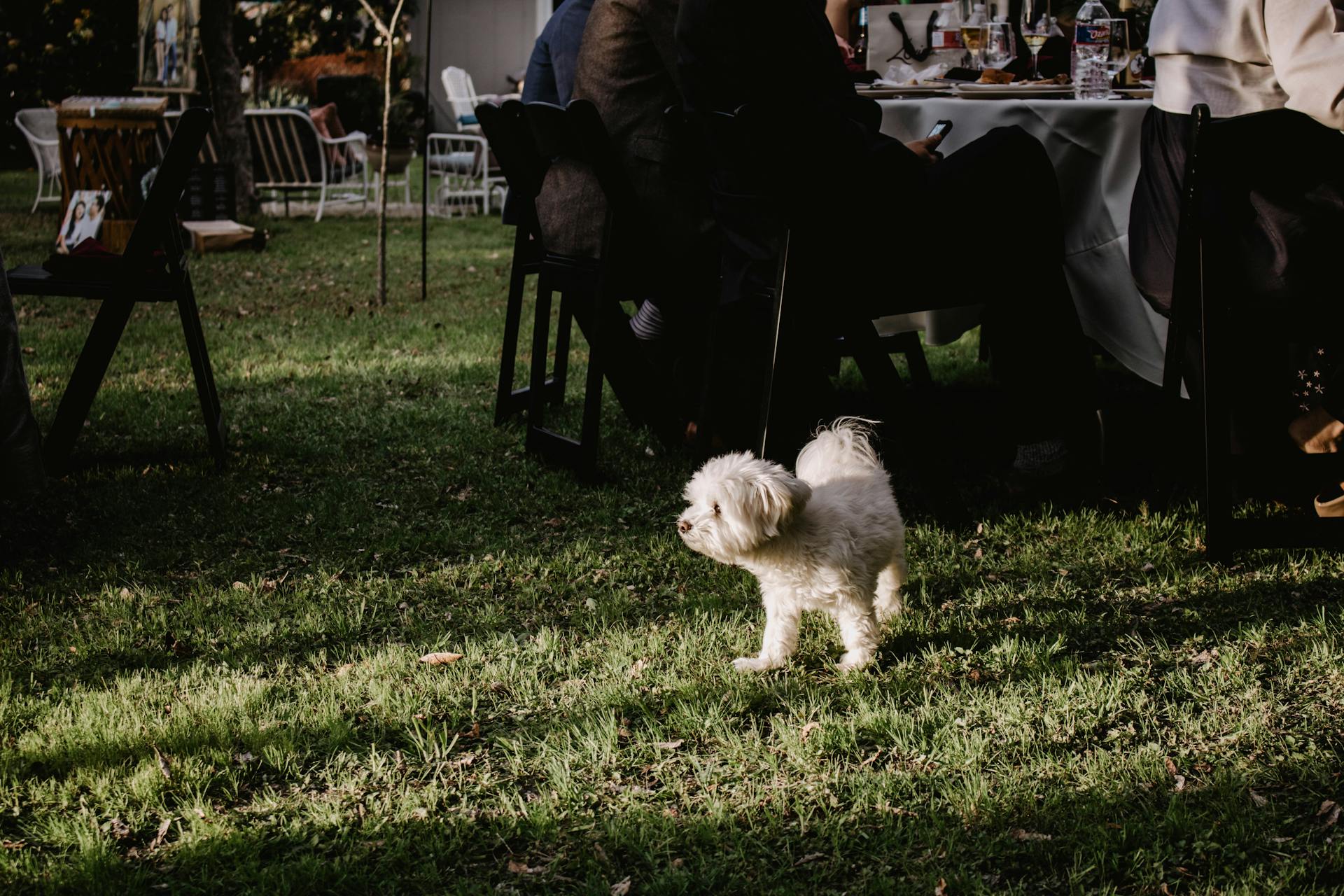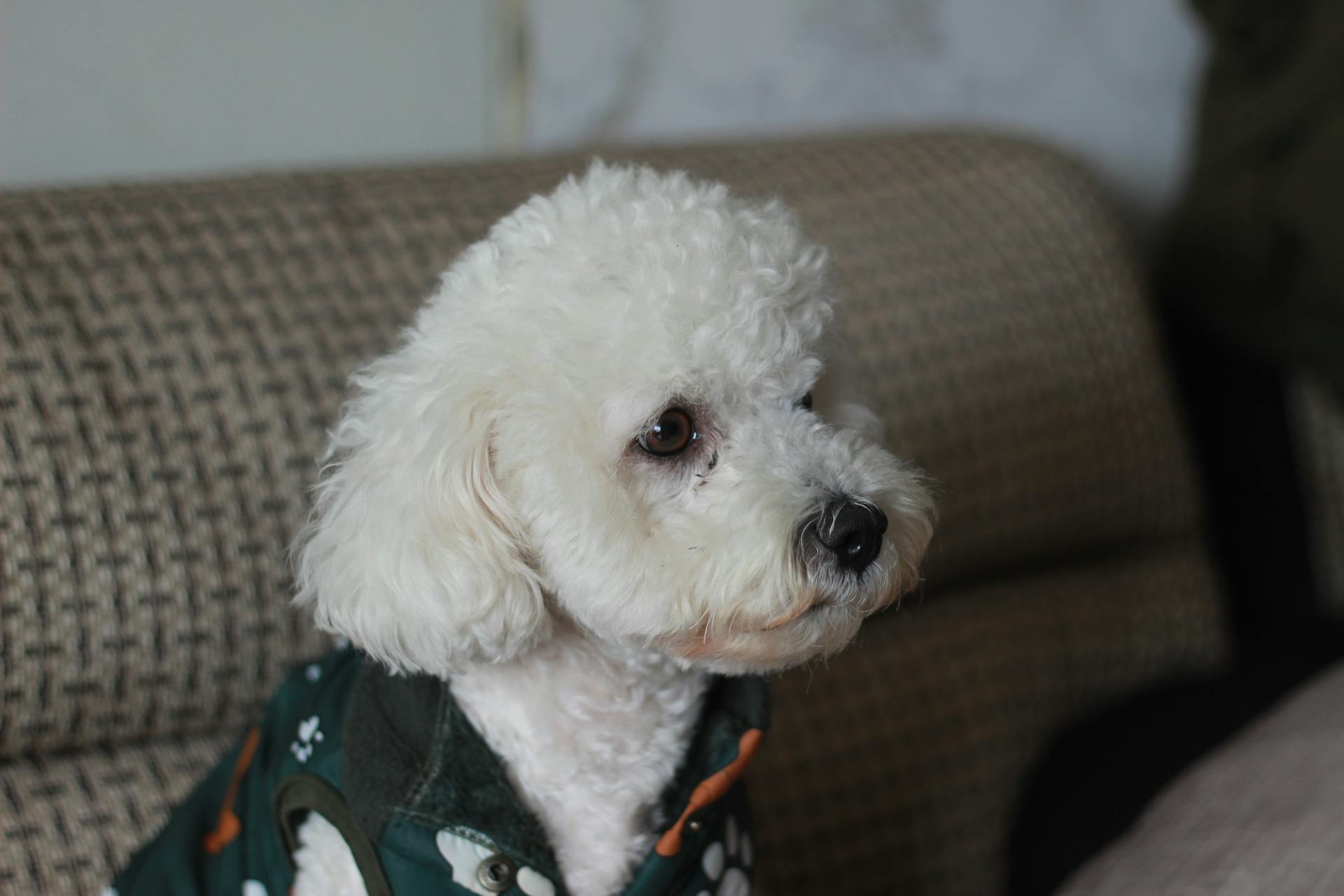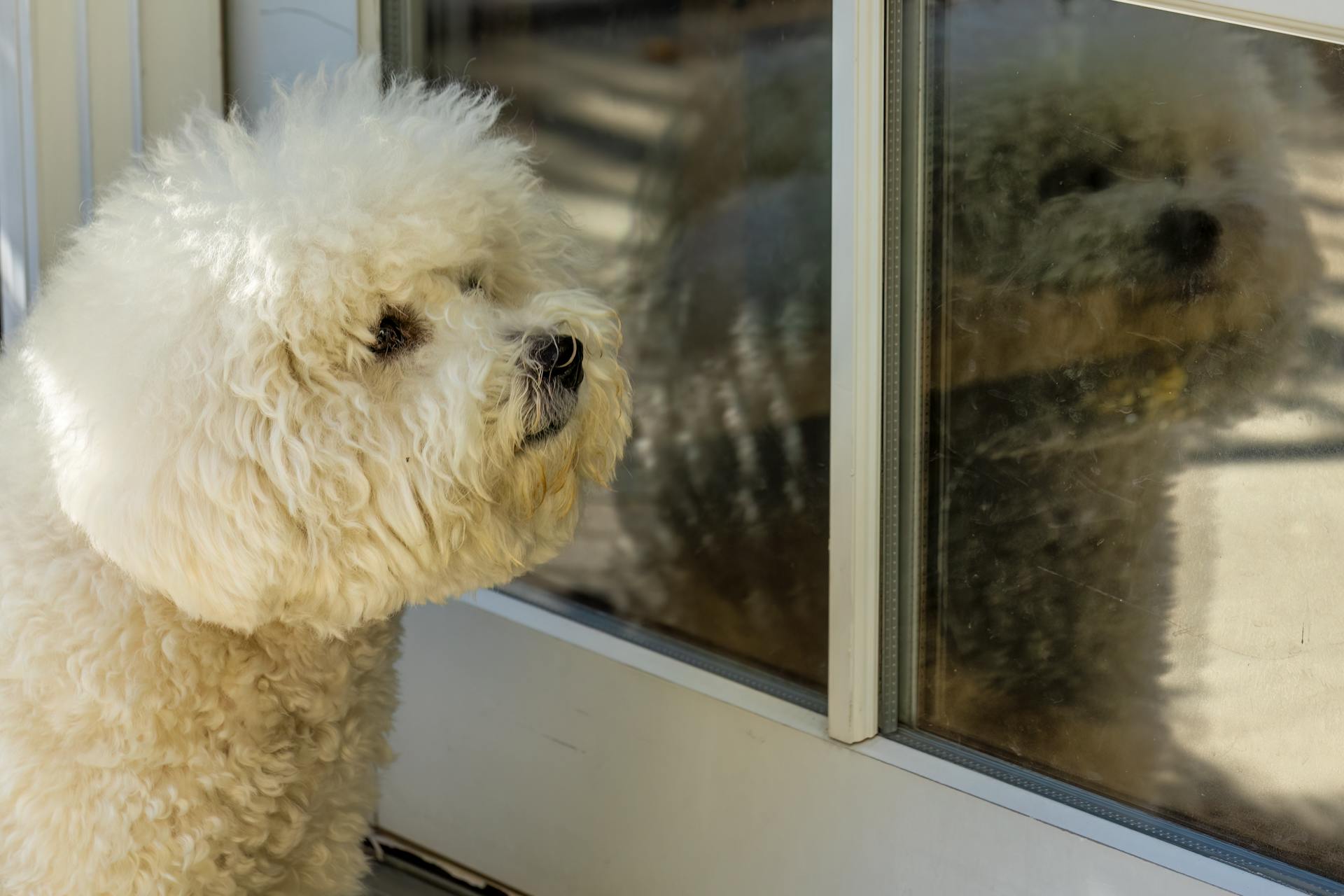
The Coton de Tulear and Bichon Frise are two small dog breeds that are often confused with each other due to their similar appearances. They are both white, fluffy, and playful, but they have distinct differences.
Coton de Tulears are known for their gentle and affectionate nature, making them a great choice for families with children. They are also relatively low-maintenance when it comes to grooming, requiring only occasional brushing and bathing.
Bichon Frises, on the other hand, are highly social dogs that thrive on attention and interaction. They require regular grooming to prevent matting and tangling of their fur, which can be time-consuming and expensive.
One of the main differences between the two breeds is their size, with Coton de Tulears typically weighing between 8-12 pounds and Bichon Frises weighing between 7-12 pounds.
Check this out: Bichon Frise How to Groom
Care and Maintenance
The Coton de Tulear has moderate exercise needs and usually responds well to training, but they do require a consistent grooming routine.
They are small and family-oriented, making them best suited for indoor life where they can be safe, warm, and loved with their family.
Coton de Tulears can make good pets for people living in apartments or small homes, but they can sometimes like to wander off, so homes where they'll be left alone outdoors should have a fenced yard.
They are intelligent and can learn to potty train with frequent ventures outside, a regular schedule, and praise when they potty in the right spot.
Crate-training can also help with potty training problems, and they love pleasing their family, making them easy to train with positive reinforcement.
They enjoy exercise and playtime, but don't require excessive daily activity, adapting to their owner's energy levels.
Coton de Tulears are known to enjoy obedience and agility training, and they love to please their family.
To keep their coat fluffy and tangle-free, brush them using an uncoated metal pin brush two or three times each week.
Smaller, fine-toothed combs used on the face will keep your dog looking stylish, and trimming their coat and fur around the face can help minimize grooming needs.
Brush especially behind the ears, elbows, and legs, and a spray conditioner while grooming can minimize hair breakage.
The more frequent grooming sessions are, the less often your Coton de Tulear will need to be bathed, with a bath needed every month or every week or two.
Whitening shampoos can keep them looking white as snow, and using a blow dryer while brushing them will make them fluffy and cottony.
To dry them off, pat gently with a towel, avoiding rubbing with a towel as it can create knots in their fur.
Additional grooming will be needed at around 15 months of age since their adult coat will be growing in.
Regular teeth brushing, ideally two or three times a week, is also essential to keep their teeth clean and healthy.
Trim their nails as needed, most likely once or twice a month, and keep their eyes and ears clean to avoid any issues.
Grooming Needs
The Coton de Tulear's grooming needs are relatively easy to manage, but they do require regular brushing to prevent matting. Brush their coat at least three to four times a week using a pin brush or metal comb.
Their wiry fur is prone to matting, especially in areas like behind the ears, legs, and elbows. Pay special attention to these areas when brushing.
Using a spray-on conditioner for dogs will help keep their coat shiny and healthy. This will also minimize breakage and make their fur easier to manage.
Bathing them once every three weeks or once a month should be enough, depending on their exposure to dirt and dust. More brushing means fewer baths, so regular brushing is key.
To prevent knotting in their coat, pat them dry instead of rubbing them with a towel after a bath. This will make the grooming process much easier.
Regular nail trimming is also essential, especially since Cotons tend to jump up on people to greet them. Keep their nails trimmed as needed to prevent any issues.
Brushing their teeth 2-3 times a week, or daily if possible, will help prevent dental diseases. This is especially important for the Coton de Tulear, as their teeth can be prone to issues.
Cleaning their ears regularly will also help prevent wax buildup and irritation. Check their ears at least weekly for any issues.
Health and Wellbeing
Coton de Tulear and Bichon Frise are both small, fluffy breeds that make wonderful companions. However, as with any breed, they can be prone to certain health issues.
Cotons are generally an extremely healthy breed, but some common health problems can occur.
Luxating patella is a condition that causes the knee cap to slip out of place, leading to symptoms like limping. It's quite common among small breed dogs, so it's essential to monitor your Coton's joints, especially when they're still growing and forming.
Hip dysplasia is another condition that can affect Cotons, causing the hip to develop abnormally and resulting in mobility problems.
Heart problems are also a concern for Cotons, with a higher risk of heart disease. Keep an eye out for symptoms like coughing or trouble breathing, and have your veterinarian examine your dog regularly.
Eye problems can also affect Cotons, including multifocal retinopathy 2, which causes retinal detachment, and progressive retinal atrophy (PRA), which causes vision loss.
Here are some common health issues that can affect Cotons:
- Luxating patella
- Hip dysplasia
- Heart problems
- Eye problems (multifocal retinopathy 2 and PRA)
- Skin allergies
- Dental problems
- Ear infections
It's essential to keep your Coton's health in check by regular veterinary check-ups and preventative care. By being aware of these potential health issues, you can take steps to prevent or manage them.
Temperament and Personality
The Coton de Tulear and Bichon Frise are both known for their charming personalities, but they have some key differences. Both breeds are lover, not fighter types and want to engage with other people and pets.
They're also both smart with plenty of emotional intelligence, making them adept at navigating the needs of people around them, especially if trained and socialized at an early age. This makes them great with kids and babies, and they can happily spend the morning romping with toddlers in the backyard.
Coton de Tulears are happy, easy-going, and lovable, with a talent for charming the pants off people. They were bred to be your canine BFFs, and they take that job seriously.
Breed History
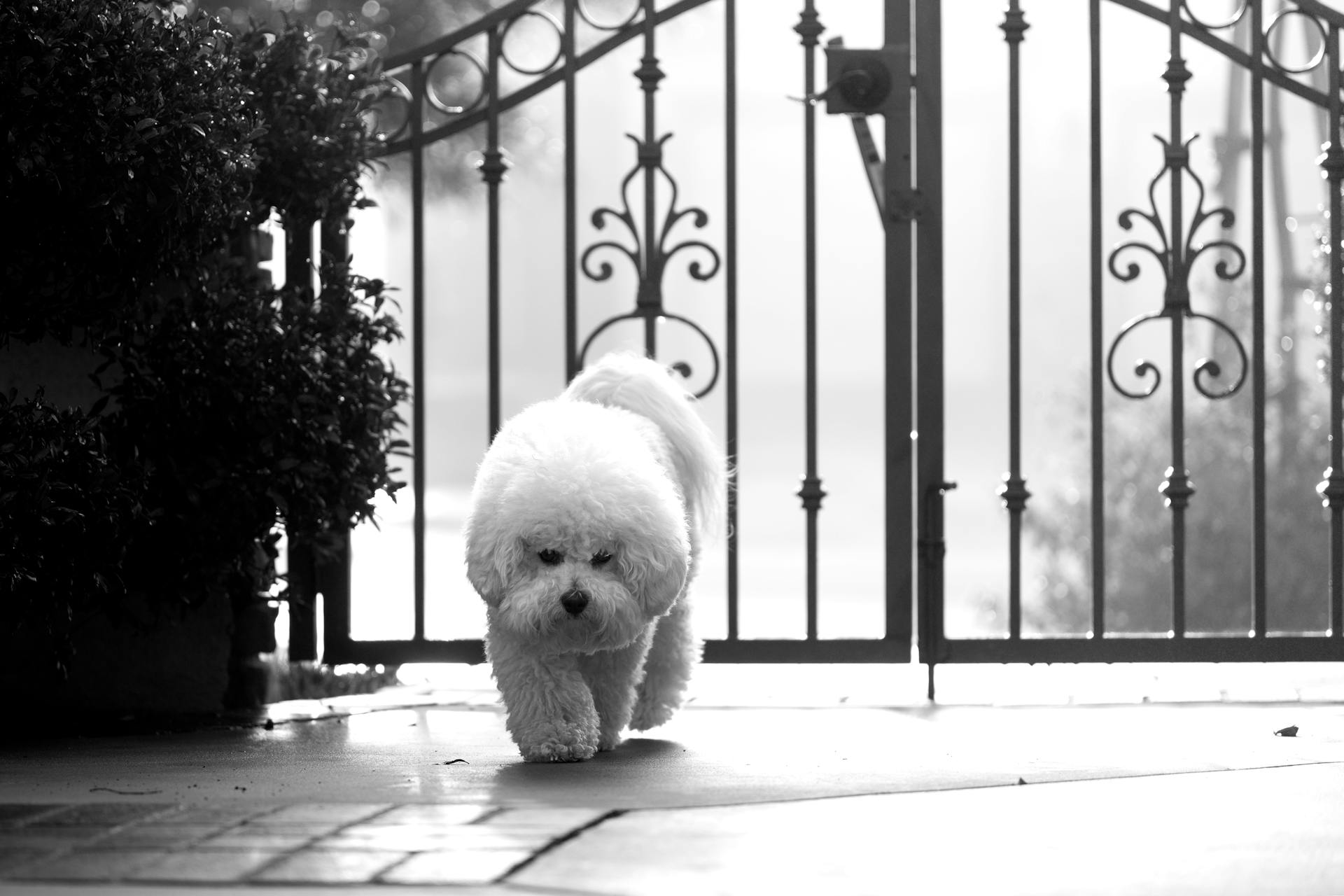
The Coton de Tulear's unique history has shaped its temperament and personality. They were originally lap dogs and companions to the noblemen and gentry of Madagascar.
Their isolation on the island for centuries allowed them to breed true, developing the characteristics that make them so prized today. This isolation lasted until 1960.
The breed's origins are still debated, but it's believed that small white dogs like the Maltese were brought to the island and mated with other dogs. This is supported by the fact that small white dogs were treasured as luxury items.
The Coton de Tulear wasn't introduced to the rest of the world until a French merchant took some back to his hometown in 1970. He selectively bred them for generations, refining the breed.
The AKC recognized the breed in 2014, registering its first Coton in the Foundation Stock Service. However, it's not yet recognized by the AKC in its full capacity.
A unique perspective: Bichon Frise Black and White
Bichon Frise Temperament
The Bichon Frise is a lover, not a fighter, and wants to engage with other people and pets. They're smart with plenty of emotional intelligence, making them adept at navigating the needs of people around them.
Bichons are great with kids and babies, and can happily spend the morning romping with toddlers in the backyard. They're also content to spend hours curled on the lap of your great grandma.
They have a calming characteristic that makes them great emotional support and therapy dogs. Bichons do not like to be left alone for long, so they need to have people around during the day.
Their name, "curly lapdog", is fitting, as they love to be close to their people. They're not high-maintenance, but they do require attention and interaction to be happy.
For another approach, see: Great Dane and Irish Wolfhound Mix
Cost and Price
When considering bringing either a Coton de Tulear or a Bichon Frise into your family, one of the main factors to think about is the cost.
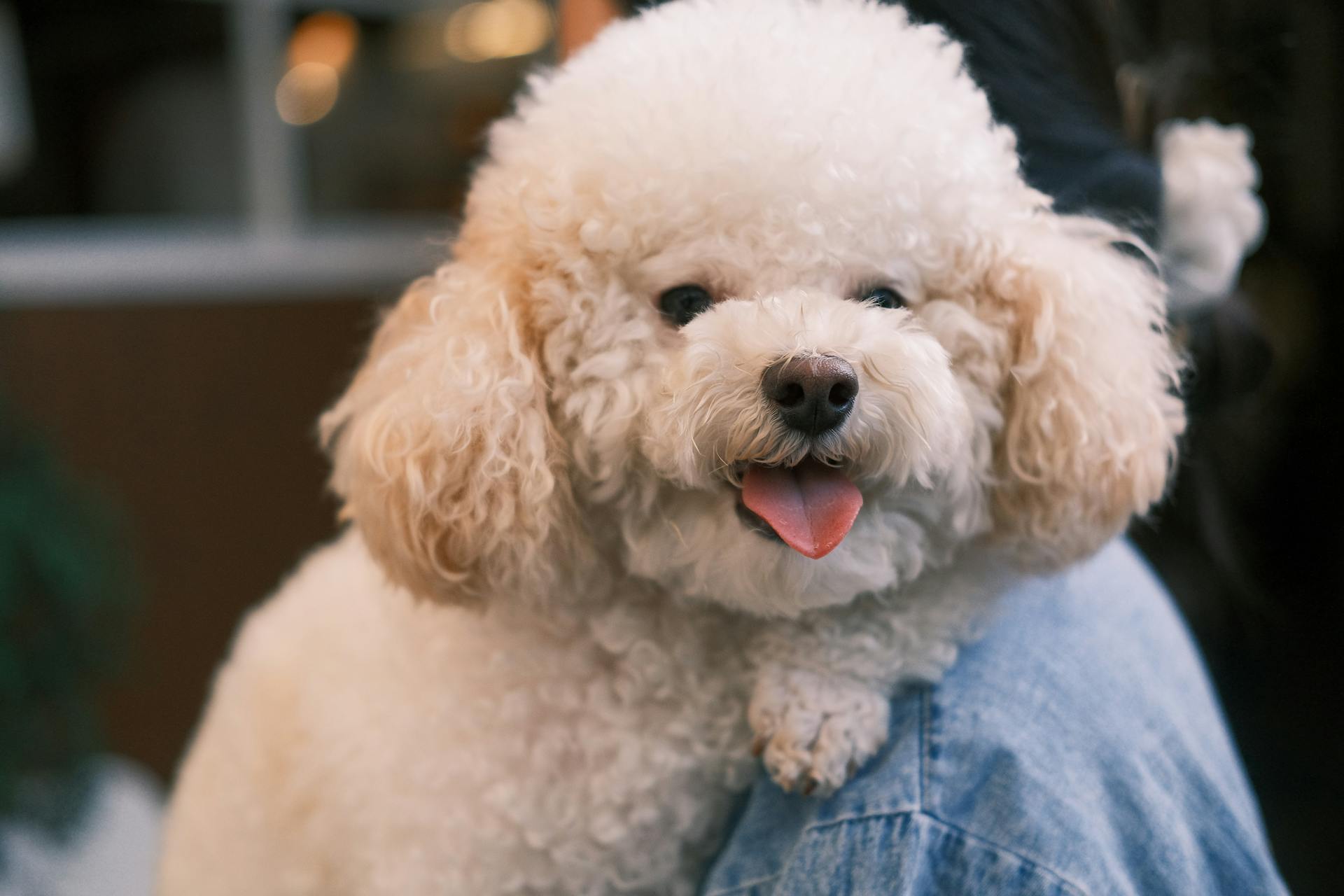
The price of a Coton de Tulear can range from $2,000 to $3,000, with show quality dogs costing even higher, typically between $3,000 and $4,000.
If you're on a tighter budget, you may want to consider adopting an adult dog from a rescue organization.
The cost of owning a Coton de Tulear or a Bichon Frise goes beyond the initial purchase price, as you'll need to factor in ongoing expenses for food, vet care, and grooming.
Regular grooming is essential for both breeds, with prices ranging from $30 to $90 per session, depending on the frequency and type of grooming needed.
In addition to these expenses, you should also consider the cost of training and socialization for your new furry friend.
Ultimately, the cost of owning a Coton de Tulear or a Bichon Frise will depend on your individual circumstances and lifestyle.
Expand your knowledge: How Much Is a Bichon Frise Puppy
Training and Behavior
Training and behavior is a crucial aspect of owning a Coton de Tulear. They are highly intelligent and eager to please, making them relatively easy to train.
Consistency is key when training a Coton, as they can be a bit stubborn at times. Regular training sessions will help them learn new skills and behaviors.
A 30-minute walk once or twice a day is enough to keep a Coton de Tulear active and happy. They are couch dogs at heart, but still need some exercise to stay healthy.
Positive reinforcement techniques, such as praise and rewards, are highly effective when training a Coton. They thrive on attention and will do well with a scheduled routine.
Cotons have the potential to excel in dog-sport activities when trained with positive methods. They are intelligent and love to learn.
House and crate training can be a bit challenging at first, but it's essential to teach them when to potty and stay out of trouble.
Traits and Characteristics
The Coton de Tulear is a small but sturdy breed with a unique appearance. They have a naturally long, profuse, cotton-like coat that requires regular grooming.
Their coat is one of their most distinctive features, and it comes in a variety of colors, including white, with slight gray and/or yellow or tan markings. These markings are usually concentrated on or around their ears.
Their eyes are rounded and dark brown or black, set wide apart and rimmed with black pigment. Their triangular ears are pendulous and set high above the line of the eyes.
One notable characteristic of the Coton de Tulear is their low tendency to bark, but they do make unique and adorable vocalizations when they talk to you.
Here's a summary of some key traits and characteristics of the Coton de Tulear:
Cons of
When owning a Coton de Tulear or a Bichon Frise, you'll want to be aware of the potential downsides of these adorable breeds. One of the main cons of Coton de Tulears is their high grooming needs, requiring regular brushing and bathing to prevent matting and tangling of their fluffy coats.
They can become destructive when bored, so it's essential to provide them with plenty of toys and activities to keep them engaged. Coton de Tulears don't like to be left alone and might experience separation anxiety, making them a poor fit for busy owners or those who are away from home for extended periods.
Here's a breakdown of the cons of Coton de Tulears:
- High grooming needs
- Can become destructive when bored
- Doesn't like to be left alone and might experience separation anxiety
Frequently Asked Questions
What are the disadvantages of a Coton de Tulear?
The Coton de Tulear may be prone to certain health issues, including luxating patella, hip dysplasia, liver shunt, disc problems, and eye concerns, which can impact its quality of life and require regular veterinary care. Understanding these potential disadvantages is essential for responsible pet ownership and making informed decisions about this breed.
What is the closest breed to a Coton de Tulear?
The closest breeds to a Coton de Tulear are the Bichon Frise, Maltese, and Havanese, all of which share similarities in temperament and coat type. These breeds are also known to have a similar gentle and playful nature.
Featured Images: pexels.com
